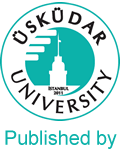Makale
Makale
Öteki Olarak İnsan: Posthümanist Kuramda Öznellik ve İdeoloji
Human as the Other: Subjectivity and Ideology in Posthumanist Theory
Umutcan TARCAN,Tuba KANCI
Yıl 2022, Sayı 15, Sayfalar:163-178
With the rise of the Renaissance and Enlightenment traditions, humanism began to take its place at the center of philosophy. The concept, which is founded on the understanding of man as the absolute subject of historical progress, has ensured the subordination of other natural subjects. As a result, an ethic of thought that associates intellectual action with the superior good of the human has emerged. The posthumanist theory, which emerged in the last quarter of the twentieth century, attempts to present a radical critique of humanism by proposing the dominance of non-human subjects. The theory argues that philosophy should produce a new form of subjectivity that transcends human, asserting that the modern human is just an imagery that damages the material conditions of life, fetishizes historical progress, and dominates technological developments. The purpose of this study is to explain the conceptual set of posthumanism in a systematic way while criticizing the discrepancies in its current state. For this, the methodological and philosophical dimensions of the theory were focused on, and they were discussed using the concepts of subject and ideology: “Subject” meets posthumanism’s epistemological struggle against the humanist status quo, while "ideology" meets the political consequences of the given struggle. In the first part of the study, the main discussions of posthumanist theorists and the tensions in the production process of posthuman subjects are examined. In the second part, the theory’s understanding of subjectivity is explained. In the third part, the possibility of a posthumanist ideological paradigm is evaluated. The study concludes that posthumanism might systematically revise its conceptual set and produce new forms of activism to exist in the public sphere.
Hümanizm, Rönesans ve Aydınlanma geleneklerinin yükselişi ile birlikte felsefenin merkezinde yer almaya başlamıştır. İnsanın tarihsel ilerlemenin mutlak öznesi olarak kavranmasına dayanan kavram, doğaya içkin olan diğer öznelerin ikincilleşmesini sağlamıştır. Böylece entelektüel eylemi insanın üstün iyiliğiyle özdeşleştiren bir düşünce etiği ortaya çıkmıştır. İlk ürünlerini 20. yüzyılın son çeyreğinde veren posthümanist kuram ise hümanizmin radikal bir eleştirisini yapmayı amaçlamış ve bunun için insan-dışı öznelerin başatlığını önermiştir. Modern insanın yaşamın maddi koşullarını zedeleyen, tarihsel ilerlemeyi fetişize eden ve teknolojik gelişmeler üzerinde tahakküm kuran bir imgelemden ibaret olduğunu tartışan kuram, felsefenin insanı aşan yeni bir öznellik biçimi üretmesi gerektiğini savunmuştur. Bu çalışmada posthümanizmin kavram setinin sistemli bir şekilde açıklanması ve mevcut hâlindeki kırılmalara eleştiri getirilmesi amaçlanmıştır. Bunun için, kuramın metodolojik ve felsefi boyutlarına odaklanılmış ve bu boyutlar, özne ve ideoloji kavramları üzerinden ele alınmıştır: “Özne” posthümanizmin hümanist statükoya karşı verdiği epistemolojik mücadeleyi, “ideoloji” ise bu mücadelenin ortaya çıkaracağı politik sonuçları karşılamaktadır. Çalışmanın birinci bölümünde posthümanist kuramcıların temel tartışmaları ve insanötesi öznelerin üretim sürecindeki gerilimleri incelenmiştir. İkinci bölümde kuramın ortaya çıkardığı öznellik anlayışı açıklanmıştır. Üçüncü bölümde ise posthümanist bir ideolojik paradigmanın imkânı araştırılmıştır. Çalışma ile posthümanizmin kamusal alanda yer alabilmek için kavram setini daha sistemli bir hâle getirebileceği ve yeni aktivizm biçimleri geliştirebileceği sonucuna varılmıştır.

